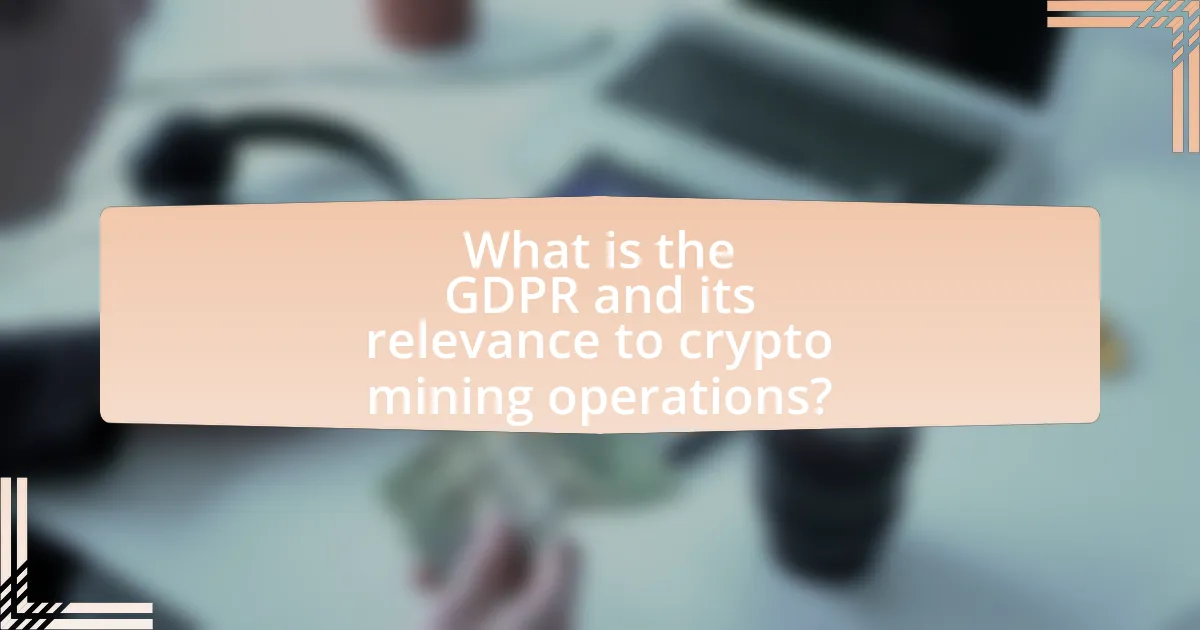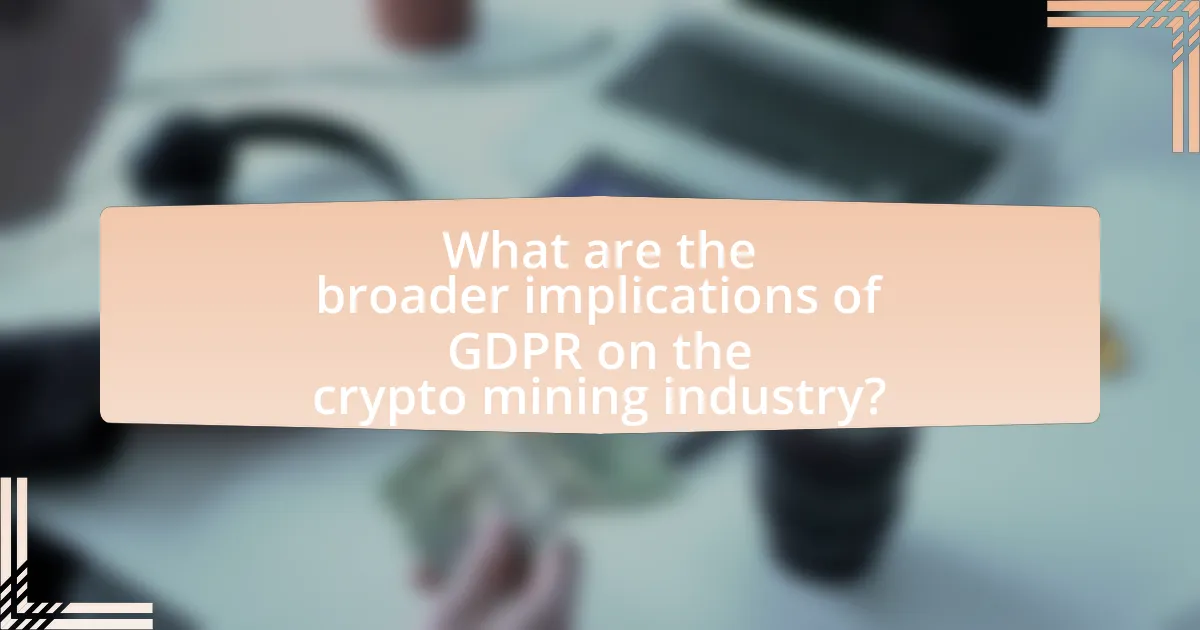The General Data Protection Regulation (GDPR) is a critical data protection law in the European Union that significantly impacts crypto mining operations. This article examines the relevance of GDPR to crypto miners, highlighting how personal data is defined and the implications of consent for data processing. It outlines key GDPR principles, such as data minimization and accountability, and discusses the potential penalties for non-compliance. Furthermore, the article explores best practices for ensuring compliance, the rights of users under GDPR, and the broader implications for the crypto mining industry, emphasizing the need for robust data protection strategies and transparency in data handling.

What is the GDPR and its relevance to crypto mining operations?
The General Data Protection Regulation (GDPR) is a comprehensive data protection law in the European Union that governs how personal data is collected, processed, and stored. Its relevance to crypto mining operations lies in the fact that these operations may inadvertently process personal data, especially when mining activities involve transactions that can be traced back to individuals. For instance, if a mining operation collects data from users or interacts with blockchain networks that contain identifiable information, it must comply with GDPR requirements, such as obtaining consent and ensuring data security. Non-compliance can result in significant fines, as the GDPR imposes penalties of up to 4% of annual global turnover or €20 million, whichever is higher.
How does the GDPR define personal data in the context of crypto mining?
The GDPR defines personal data as any information relating to an identified or identifiable natural person, which includes data that can be linked to an individual through identifiers such as names, identification numbers, location data, or online identifiers. In the context of crypto mining, if the mining process involves the collection or processing of such identifiable information, it falls under the scope of GDPR regulations. This is particularly relevant when miners interact with users or handle transactions that can be traced back to individuals, thereby necessitating compliance with data protection principles outlined in the GDPR.
What types of data are considered personal under the GDPR?
Personal data under the GDPR includes any information that relates to an identified or identifiable natural person. This encompasses a wide range of data types, such as names, identification numbers, location data, online identifiers, and specific characteristics that can identify an individual. The GDPR defines personal data broadly to ensure comprehensive protection, which is crucial for compliance in various sectors, including crypto mining operations where user data may be processed.
How does the definition of personal data impact crypto miners?
The definition of personal data significantly impacts crypto miners by imposing strict regulations on how they handle user information. Under the General Data Protection Regulation (GDPR), personal data is defined as any information that relates to an identified or identifiable individual, which includes data generated through blockchain transactions. Consequently, crypto miners must ensure compliance with GDPR requirements, such as obtaining explicit consent from users before processing their data and implementing measures to protect this data from breaches. Failure to comply can result in substantial fines, as evidenced by the European Data Protection Board’s enforcement actions, which have levied penalties reaching millions of euros against non-compliant entities. Thus, the definition of personal data directly influences the operational practices and legal responsibilities of crypto miners.
What are the key principles of the GDPR that affect crypto mining?
The key principles of the GDPR that affect crypto mining include data minimization, purpose limitation, and accountability. Data minimization mandates that only necessary personal data should be processed, which impacts how mining operations handle user data. Purpose limitation requires that data collected must be for legitimate purposes, affecting the rationale behind data usage in mining activities. Accountability emphasizes that organizations must demonstrate compliance with GDPR, influencing how crypto mining operations manage and protect personal data. These principles ensure that mining operations adhere to strict data protection standards, thereby safeguarding user privacy and fostering trust in the cryptocurrency ecosystem.
How do data protection by design and by default apply to crypto mining operations?
Data protection by design and by default mandates that crypto mining operations integrate data protection measures into their processes from the outset. This means that systems and technologies used in mining must be configured to minimize personal data collection and ensure that any data processing complies with GDPR principles. For instance, mining operations should implement encryption and anonymization techniques to protect user data, thereby reducing the risk of data breaches. Additionally, default settings should prioritize privacy, ensuring that users are not automatically opted into data sharing unless they provide explicit consent. This approach aligns with GDPR’s emphasis on accountability and transparency in data handling practices, reinforcing the need for crypto mining entities to adopt robust data protection strategies from the beginning.
What are the implications of consent for data processing in crypto mining?
Consent for data processing in crypto mining has significant implications under the General Data Protection Regulation (GDPR). Specifically, obtaining explicit consent from individuals whose data is processed is crucial, as failure to do so can lead to legal penalties and operational disruptions. The GDPR mandates that consent must be informed, specific, and freely given, which means crypto mining operations must ensure transparency about how personal data is used, including the potential risks involved. Non-compliance can result in fines up to 4% of annual global turnover or €20 million, whichever is higher, emphasizing the importance of adhering to consent requirements in data processing activities related to crypto mining.
What are the potential penalties for non-compliance with GDPR in crypto mining?
The potential penalties for non-compliance with GDPR in crypto mining can include fines of up to €20 million or 4% of the annual global turnover, whichever is higher. These penalties are enforced by data protection authorities and can be applied for violations such as failing to obtain proper consent for data processing or not implementing adequate security measures to protect personal data. The severity of the penalties reflects the GDPR’s aim to ensure strict adherence to data protection standards across all sectors, including crypto mining, where personal data may be processed.
What constitutes a breach of GDPR in the context of crypto mining operations?
A breach of GDPR in the context of crypto mining operations occurs when personal data is processed without lawful basis, fails to meet data protection principles, or lacks adequate security measures. For instance, if a mining operation collects or processes personal data of individuals without their consent or legitimate interest, it violates GDPR Article 6, which outlines the conditions for lawful processing. Additionally, if the operation does not implement appropriate technical and organizational measures to protect personal data, as mandated by GDPR Article 32, it constitutes a breach. Such breaches can lead to significant fines, as seen in cases where companies have been penalized for inadequate data protection practices.
How can crypto miners mitigate the risk of GDPR violations?
Crypto miners can mitigate the risk of GDPR violations by implementing data minimization practices and ensuring compliance with data protection principles. By limiting the collection and processing of personal data to what is strictly necessary for their operations, miners can reduce the likelihood of violating GDPR regulations. Additionally, employing robust encryption methods and anonymizing user data can further protect personal information, aligning with GDPR’s requirements for data security and privacy. Regular audits and training on GDPR compliance for all personnel involved in mining operations can also enhance adherence to legal standards, thereby minimizing risks associated with potential violations.

How does GDPR influence the operational practices of crypto miners?
GDPR influences the operational practices of crypto miners by imposing strict data protection regulations that require miners to ensure the privacy and security of personal data. Crypto miners must implement measures such as data encryption, access controls, and regular audits to comply with GDPR’s principles of data minimization and accountability. For instance, if miners process personal data, they must obtain explicit consent from individuals and provide transparency regarding data usage, which can complicate mining operations that rely on large datasets. Additionally, non-compliance can result in significant fines, as seen in cases where companies faced penalties for failing to protect user data, reinforcing the need for miners to adapt their practices to align with GDPR requirements.
What changes must crypto mining operations implement to comply with GDPR?
Crypto mining operations must implement data protection measures, including data minimization, user consent protocols, and secure data storage, to comply with GDPR. These changes involve ensuring that personal data is only collected when necessary, obtaining explicit consent from users before processing their data, and employing encryption and access controls to protect stored data. Compliance is essential as GDPR mandates that organizations demonstrate accountability and transparency in their data handling practices, with potential fines reaching up to 4% of annual global turnover for non-compliance.
How can crypto miners ensure transparency in data processing activities?
Crypto miners can ensure transparency in data processing activities by implementing blockchain technology, which inherently provides a public ledger of all transactions. This ledger allows for real-time tracking and verification of data processing activities, making it accessible to all stakeholders. Additionally, miners can adopt compliance measures aligned with GDPR, such as conducting Data Protection Impact Assessments (DPIAs) to evaluate risks and ensure that data processing is lawful and transparent. By utilizing cryptographic techniques, miners can also secure data while maintaining the ability to audit and verify processing activities, thus reinforcing transparency.
What role does data minimization play in crypto mining compliance?
Data minimization plays a crucial role in crypto mining compliance by ensuring that only the necessary personal data is collected and processed, in alignment with GDPR principles. This principle mandates that organizations limit data collection to what is essential for their operations, thereby reducing the risk of data breaches and enhancing user privacy. For instance, by minimizing the amount of personal data retained, crypto mining operations can better comply with GDPR requirements, which stipulate that data should not be kept longer than necessary. This approach not only mitigates legal risks but also fosters trust among users, as they are more likely to engage with entities that prioritize their data protection.
How does GDPR affect the relationship between crypto miners and their users?
GDPR affects the relationship between crypto miners and their users by imposing strict data protection regulations that require miners to handle personal data responsibly. Under GDPR, crypto miners must ensure that any personal data they collect from users is processed lawfully, transparently, and for specific purposes. This means that miners must obtain explicit consent from users before collecting their data and must provide clear information about how that data will be used. Additionally, users have the right to access their data, request corrections, and demand deletion, which can complicate the operational processes for miners. Non-compliance with GDPR can result in significant fines, which further incentivizes miners to prioritize user privacy and data security in their operations.
What rights do users have under GDPR that impact crypto mining operations?
Users have several rights under the General Data Protection Regulation (GDPR) that can significantly impact crypto mining operations. These rights include the right to access personal data, the right to rectification, the right to erasure (also known as the right to be forgotten), the right to restrict processing, the right to data portability, and the right to object to processing.
For instance, the right to access allows users to obtain confirmation of whether their personal data is being processed and to access that data, which can affect how mining operations handle user data. The right to erasure enables users to request the deletion of their personal data, potentially limiting the data retained by mining operations. Additionally, the right to object allows users to challenge the processing of their data, which can directly influence the operational practices of crypto miners who may rely on user data for various purposes.
These rights are enshrined in GDPR, which came into effect in May 2018, and they impose obligations on organizations, including those involved in crypto mining, to ensure compliance with data protection principles.
How can crypto miners facilitate user rights regarding their personal data?
Crypto miners can facilitate user rights regarding their personal data by implementing privacy-preserving technologies and adhering to data protection regulations such as the General Data Protection Regulation (GDPR). By utilizing techniques like zero-knowledge proofs and encryption, miners can ensure that personal data is processed in a way that protects user identities and complies with GDPR requirements. For instance, GDPR mandates that users have the right to access their data, rectify inaccuracies, and request deletion. Miners can facilitate these rights by integrating systems that allow users to easily manage their data preferences and exercise their rights, thereby enhancing transparency and accountability in their operations.

What are the broader implications of GDPR on the crypto mining industry?
The broader implications of GDPR on the crypto mining industry include increased compliance costs and operational adjustments due to stringent data protection requirements. Crypto mining operations often involve the processing of personal data, which necessitates adherence to GDPR principles such as data minimization, purpose limitation, and the right to erasure. For instance, miners must implement robust data security measures and ensure transparency in data handling practices, which can lead to significant financial and administrative burdens. Additionally, non-compliance can result in hefty fines, as seen in cases where companies faced penalties reaching up to 4% of their annual global turnover. This regulatory framework compels the crypto mining industry to adopt more responsible data management practices, ultimately influencing its operational landscape and market competitiveness.
How does GDPR shape the future of data privacy in the crypto sector?
GDPR significantly influences the future of data privacy in the crypto sector by imposing strict regulations on data handling and user consent. This regulation mandates that crypto companies must ensure transparency in data processing, requiring them to inform users about how their data is collected, used, and stored. Additionally, GDPR enforces the right to data access and deletion, compelling crypto entities to implement robust data management practices. As a result, compliance with GDPR not only enhances user trust but also drives innovation in privacy-focused technologies within the crypto industry, as companies seek to align their operations with these legal standards.
What trends are emerging in crypto mining due to GDPR compliance requirements?
Emerging trends in crypto mining due to GDPR compliance requirements include increased focus on data minimization and enhanced privacy measures. Crypto mining operations are adapting by implementing systems that limit the collection and processing of personal data, ensuring that only necessary information is retained. This shift is driven by the need to comply with GDPR’s principles, which mandate that organizations must protect user data and respect privacy rights. Additionally, there is a growing trend towards the use of decentralized technologies that inherently align with GDPR’s requirements, as they can reduce the risk of data breaches and enhance user control over personal information. These adaptations are essential for maintaining regulatory compliance while continuing to operate within the evolving landscape of cryptocurrency.
How might GDPR influence regulatory developments in the crypto industry?
GDPR may significantly influence regulatory developments in the crypto industry by imposing strict data protection requirements that crypto businesses must comply with. As the General Data Protection Regulation mandates that organizations protect the personal data and privacy of EU citizens, crypto firms will need to implement robust data management practices to avoid hefty fines, which can reach up to 4% of annual global turnover. This regulatory pressure could lead to increased transparency and accountability in the industry, prompting the adoption of best practices for data handling and user consent. Furthermore, the necessity for compliance may drive innovation in privacy-focused technologies within the crypto sector, as companies seek to align their operations with GDPR standards while maintaining competitive advantages.
What best practices can crypto miners adopt to align with GDPR?
Crypto miners can adopt several best practices to align with GDPR, including implementing data minimization, ensuring transparency, and establishing robust data protection measures. Data minimization involves collecting only the personal data necessary for mining operations, thereby reducing the risk of non-compliance. Transparency can be achieved by clearly informing users about data collection practices and their rights under GDPR, which fosters trust and compliance. Additionally, implementing strong data protection measures, such as encryption and access controls, helps safeguard personal data against breaches, aligning with GDPR’s requirements for data security. These practices are essential as GDPR imposes strict regulations on the processing of personal data, and non-compliance can result in significant fines, emphasizing the importance of adherence for crypto miners.
How can crypto mining operations implement effective data protection strategies?
Crypto mining operations can implement effective data protection strategies by adopting robust encryption methods, ensuring compliance with GDPR regulations, and conducting regular security audits. Encryption protects sensitive data by converting it into a secure format that can only be accessed with the correct decryption key, thereby mitigating risks of data breaches. Compliance with GDPR mandates that organizations implement appropriate technical and organizational measures to safeguard personal data, which includes conducting Data Protection Impact Assessments (DPIAs) to identify and minimize risks. Regular security audits help identify vulnerabilities in the system, allowing for timely updates and improvements to security protocols. These strategies collectively enhance the overall data protection framework within crypto mining operations.
What tools and resources are available for crypto miners to ensure GDPR compliance?
Crypto miners can utilize several tools and resources to ensure GDPR compliance, including data protection impact assessment (DPIA) tools, encryption software, and GDPR compliance frameworks. DPIA tools help identify and mitigate risks associated with personal data processing, while encryption software secures sensitive data, making it less vulnerable to breaches. Additionally, GDPR compliance frameworks, such as those provided by the International Association of Privacy Professionals (IAPP) and the European Union Agency for Cybersecurity (ENISA), offer guidelines and best practices for adhering to GDPR requirements. These resources collectively assist crypto miners in navigating the complexities of data protection regulations effectively.